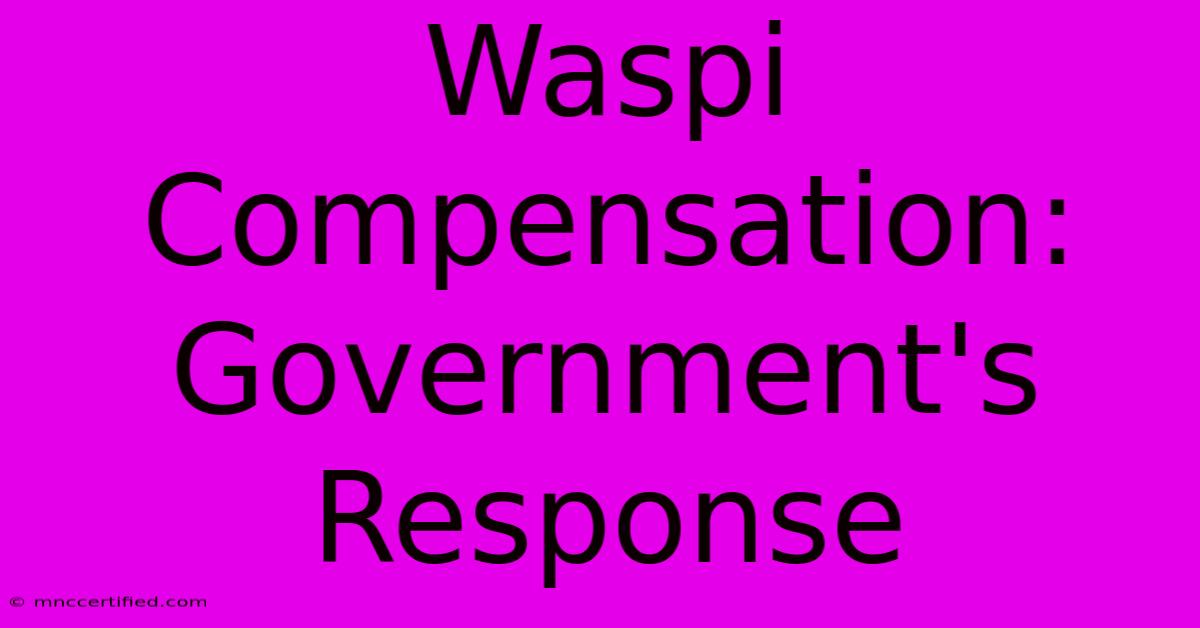Waspi Compensation: Government's Response

Table of Contents
Waspi Compensation: The Government's Response and the Ongoing Fight for Justice
The WASPI (Women Against State Pension Inequality) campaign has been a powerful force, highlighting the unfairness faced by women born in the 1950s due to changes in the state pension age. These women experienced significant financial hardship due to the accelerated increase in the state pension age, with many finding themselves unprepared for retirement. This article will delve into the government's response to the WASPI women's concerns, examining the compensation offered (or lack thereof) and the ongoing fight for justice.
The Core Issue: Unforeseen Changes and Financial Fallout
The central issue revolves around the lack of sufficient notice given to these women regarding the changes to the state pension age. Many were unaware of the impending changes, leading to inadequate planning for their retirement years. This resulted in significant financial strain, impacting their quality of life and leaving many struggling to make ends meet. The abrupt changes directly affected their financial security, leading to widespread anger and frustration. This lack of adequate communication was a key factor in the genesis and ongoing momentum of the WASPI campaign.
The Government's Initial Response: Denial and Deflection
Initially, the government's response to WASPI's demands was largely dismissive. They argued that the changes were necessary for the long-term sustainability of the state pension system and that adequate notice had been provided. This stance, however, failed to address the significant personal hardships experienced by many women who had made life choices based on the then-current pension age expectations. This initial lack of empathy fueled the campaign's growth and solidified public support.
Waspi Compensation: The Government's Limited Offer
Following years of pressure from WASPI and mounting public awareness, the government eventually offered a limited compensation package. However, this offer fell short of the expectations of many campaigners, leading to continued protest and legal challenges. The details of this package, including eligibility criteria and payment amounts, proved to be controversial, leaving many women feeling unjustly treated. Many feel the compensation is not proportionate to the financial losses they've suffered.
Key criticisms of the compensation include:
- Insufficient Amount: Many women argue the offered compensation is far too low to offset the years of lost income.
- Eligibility Criteria: The specific criteria used to determine eligibility have been heavily criticized as being too restrictive, excluding women who experienced significant hardship.
- Lack of Individualized Assessment: The compensation was largely based on a blanket approach, failing to adequately acknowledge individual circumstances and financial losses.
The Ongoing Fight: Legal Challenges and Continued Advocacy
The WASPI campaign continues its fight for fair compensation, pursuing legal avenues and maintaining sustained public pressure on the government. High-profile legal battles and continued media coverage have kept the issue in the public consciousness. The campaign's unwavering dedication highlights the systemic issues surrounding pension reform and its unequal impact on specific demographics.
The fight is not just about financial redress but also about acknowledging the systemic injustice faced by these women. It highlights the need for greater transparency and clearer communication when significant changes to social security systems are implemented.
Looking Ahead: Lessons Learned and Future Implications
The WASPI campaign underscores the importance of proactive government communication and transparent policy-making. The government's response, while ultimately resulting in some form of compensation, highlights the need for more effective engagement with affected groups during significant policy changes. The long-term implications extend beyond the immediate financial impact on the WASPI women; it necessitates a re-evaluation of how pension reforms are communicated and implemented, ensuring fairer outcomes for all. The legacy of the WASPI campaign will likely influence future pension policy and increase accountability within the government.
Keywords: WASPI, Women Against State Pension Inequality, state pension age, pension injustice, government response, compensation, retirement planning, financial hardship, legal challenges, social security, pension reform, women's rights, age discrimination.

Thank you for visiting our website wich cover about Waspi Compensation: Government's Response. We hope the information provided has been useful to you. Feel free to contact us if you have any questions or need further assistance. See you next time and dont miss to bookmark.
Featured Posts
-
17 Hour Weather Alert For North Wales
Dec 18, 2024
-
Fallon Sherrock Darts Trailblazer
Dec 18, 2024
-
Hodgkinson Voted Bbc Sports Personality
Dec 18, 2024
-
And Ones Nba Cup Timma Trade Buzz
Dec 18, 2024
-
Djerfs Response Toxic Workplace Allegations
Dec 18, 2024